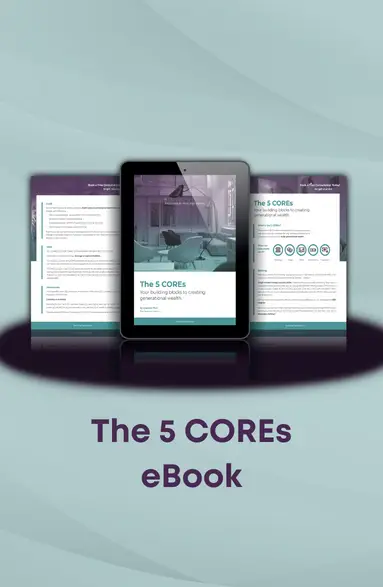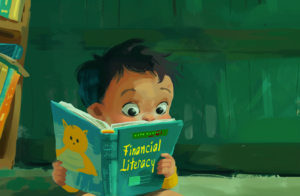Debt is a necessary part of life for many people. But how much debt is too much? This is a question that plagues many people, especially in today’s economy. The answer is not always clear-cut, but there are some guidelines that can help you make a decision. In this article, we will be discussing some of the factors to consider when determining how much debt is too much. But more importantly, not all debt is equal. There is such a thing as good and bad debt.
Most people would agree that there is such a thing as too much debt. However, debt can help you buy a home, start a business, or pay for a child’s education. These aren’t necessarily bad things, if leveraged properly they can assist you in getting ahead.
For some people, a little debt may be manageable. For others, a lot of debt can be overwhelming. The important thing is to understand your own financial situation and make sure you can handle the payments. If you get overwhelmed easily by debt, the most beneficial skill would be for you to learn the discipline because 99% of millionaires ALL leverage debt to build their wealth.
In this article, we will be discussing the different types of debt and how to determine if you have too much.
The Dangers Of Too Much Debt
Debt can be a dangerous thing if it’s not managed properly. Having too much debt can lead to financial ruin and even bankruptcy. It’s important to understand the dangers of too much debt before you find yourself in over your head.
There are two main types of debt: good and bad. Good debt is considered an investment, something that will generate income for you. Ideally more than your monthly payments so that you’re actually making enough money to pay back the loan AND pocket the difference.
Most financial advisors will tell you that good debt is like a mortgage or student loan. But this is FAR from the truth. A mortgage falls into BAD debt if it’s a house you’re planning to live in. Unless you have a boatload of cash that you need to park somewhere and you want to fight inflation, otherwise it’s a terrible place to park your money or you might overextend and become “house poor”. It took approximately four years to convince my husband of this, so if you’re confused about why buying a home for yourself is bad debt, find me on social and send me a DM to chat about this. I will respond!
Bad debt is anything that doesn’t help you grow financially, like credit card debts or car loans with high-interest rates. Payment plans with interest because you really wanted that Black Friday deal but could only afford it with payment plans. Unless that purchase is going to generate more income, installments/payment plans are usually bad debt.
If you have too much good debt, it can become difficult to keep up with the monthly payments if you are blindly throwing that into investments that you don’t understand or haven’t done the research for. This can lead to late payments, which will damage your credit score and make it harder to borrow money in the future when you really need it – like for a home purchase or emergency expenses. I
If you have too many different types of debts (like both student loans AND credit cards), it becomes more difficult to manage them all effectively – increasing the chances that something will slip through the cracks and cause long-term problems down the road.
The Consequences Of Too Much Debt
Debt can be a good thing. It allows us to buy homes, cars, and other items that we may not be able to afford outright. However, too much debt can lead to financial ruin. When you are unable to make your payments, your creditors may begin calling or even sue you. Ever had collectors call you on a regular basis – not fun! Not only does this damage your credit score and make it difficult for you to borrow money in the future. Worse yet, if you declare bankruptcy, all of your assets could be liquidated in order to repay your debts. Not to mention it takes 7 full years for bankruptcy to be wiped from your credit report.
If you find yourself struggling with debt, there are some things you can do before it gets too out of control:
1. Create a budget and stick to it
This will help ensure that you are only spending what you can afford each month; A quick tip here is to overcalculate your bills and underbudget your income, this will help automatically create a buffer in your monthly budget – even if it’s only a few dollars. Remember, it’s the practice and discipline that you’re trying to build from ground 0. If you’re already a budget badass, then reevaluate your budget and see what you can adjust. Need help? Jump on a roadmap call with me today!
2. Make more than the minimum payment on your debts
By doing this, you’ll reduce the amount of interest charged over time and pay off your debt quickly. It also looks better on your credit report, even if you only pay $5-$10 extra above the minimum requirement.
3. Consider consolidating or refinancing high-interest loans
Doing this could save you money each month on interest charges. Look for balance transfer credit cards. If you can’t pay down your debt right away, using a balance transfer can at least help bring your overall credit utilization down. This accounts for 35% of your overall credit report.
4. Seek professional help from a certified credit counselor
They might be able to assist by negotiating lower monthly payments with your creditors or developing a repayment plan that fits within your budget. There is NO shame in getting help when it comes to finances. You can’t learn something if it’s never talked about.
The Causes Of Too Much Debt
There are many factors that can contribute to someone accumulating too much debt. Some of the more common causes include:
1. Living beyond one’s means
This is perhaps the most common cause of too much debt. People often spend more money than they earn and put themselves in a difficult financial situation as a result. This can be due to things like impulse buying, keeping up with the Joneses, or simply not being mindful of one’s spending habits.
2. Unexpected expenses
Sometimes life throws us curve balls and we have to incur unexpected costs, such as medical bills, car repairs, or emergency pet expenses. If we’re not financially prepared for these sorts of events, it can easily lead to accumulating too much debt.
3. Poor money management skills
If you don’t know how to manage your finances properly, it’s very easy to end up in debt. This might involve things like failing to budget correctly or making wise investment choices. It’s important to educate yourself on proper money management if you want to avoid falling into this trap. This can look different as your family might have unique needs, but regardless of your financial situation, the skill and discipline need to be developed to achieve financial success.
The Solutions To Too Much Debt
Debt can feel like a never-ending cycle. You get out of one debt only to find yourself buried in another. It can be tough to keep up with the minimum payments, let alone make any progress on actually paying off your debts. If you’re struggling with too much debt, you’re not alone. In fact, according to a recent survey by NerdWallet, about 60% of Americans say they have more debt than they can handle comfortably.
There are some solutions available that can help you pay down your debt and get back on track financially:
1. Consolidate Your Debts
This involves taking out a new loan to pay off all of your existing debts. By consolidating your debts into one monthly payment, you may be able to reduce or eliminate interest charges and save money each month.
One thing to watch out for is making sure the interest rate on the new consolidation loan is lower than the rates on your existing loans; otherwise, this strategy could end up costing you more in the long run instead of helping you save money. Another downside is that if you consolidate federal student loans into a private consolidation loan, you would lose certain protections offered by the government such as income-driven repayment plans. So before consolidating any loans, it’s important to do some research first and then compare offers from multiple lenders.
2. Create A Debt Snowball Or Avalanche Plan
The “debt snowball method” refers to tackling smaller balances first while making just minimum payments on larger ones. Once the small balance is paid off, move on to tackling the next smallest balance and so forth until all outstanding debts are eventually eradicated. This method works well if you’re a visual person.
The main advantage of this tactic is that the early wins can provide a motivational boost that keeps people from giving up altogether when faced with what seems to be an insurmountable amount of over-indebtedness. One possible drawback to employing a snowball approach however is making late payments or going over credit limits since the focus is on repaying debt themselves rather than incurring additional costly penalties and fees which would setback progress made in getting out of the debt faster. This is where discipline comes in, while focusing on your main debt you need to still monitor the others.
- Make sure no credit card goes over the limit
- Ensure you’re not using the other cards as much, or at all, to avoid incurring MORE debt – because then you’re just putting yourself in an endless cycle of debt.
Another option for those who want to commence by attacking their high-interest balances first is called the avalanche method which involves ranking one’s obligations according to their APR from highest to lowest and working diligently to pay those off before moving on to the next most expensive itemized billon list.
3. Try For A Hardship Program With Creditors
Some creditors may offer hardship programs for customers who contact them about experiencing financial difficulties making regularly scheduled monthly payments due to permanent or temporary circumstances beyond their control such as job loss illness etc.
These programs may offer you a reduced minimum payment rate which can help direct where your money is going and reduce some stress. You may still accumulate additional interest within the program but it might be worth it for the mental sanity.
The Prevention Of Too Much Debt
Debt is a very real and serious issue that many people face. It can be difficult to prevent yourself from getting into too much debt if you’re already there, but it is important to try. Here are three tips to help you avoid becoming overwhelmed by debt:
1. Live within your means
One of the best ways to avoid accumulating too much debt is to simply live within your means. Track your income and expenses so that you know how much money you have coming in each month and what bills/purchases need to be paid out of that amount. Be realistic about what you can afford and resist the urge to overspend on unnecessary items. Remember, this is temporary until all your bad debts are paid off.
2. Have an emergency fund
Unexpected events happen all the time, whether it’s a car repair or a medical bill not covered by insurance… And if these types of emergencies pop up when you’re already struggling financially, they can quickly lead to even more debt. That’s why experts recommend having an emergency fund equal to at least 3-6 months’ worth of living expenses set aside so that you’re prepared for whatever life throws your way.
If you already have an emergency fund, consider creating a “maintenance fund” so that you don’t have to dip into your emergency fund. We use a maintenance fund for things like household upgrades, car repairs, etc. These are things we need every year (at least an oil change), but it’s not an emergency per se. I’m also Asian and somewhat still cheap so I don’t ever want to have to dip into my emergency fund unless it’s ABSOLUTELY necessary.
3. Generate MORE income
I say this quite often because the truth is, if you’re struggling and short of cash then the obvious answer is to simply get more cash. This is THE most underrated way to get ahead of your debts. I’ve got more examples in this blog here on generating passive income.
4. Discipline – How badly do you want this?
This is the question I ask myself often when it comes to debt. How badly do I want to get out of debt, how badly do I want to grow my wealth and get ahead? Be 1000% honest with yourself and your family, because if you only “somewhat” want to get out of debt but your yearly 6K family vacation is more important for you, perhaps it is a matter of adjusting your priorities and living with debt. As long as it doesn’t bankrupt you, it’s okay. You still get a choice in how you want to live your life.
Final Thoughts
Debt is a necessary evil in our society. The amount of debt you carry is important, but it is only one factor in your financial health. Your debt-to-income ratio is another important metric. This ratio compares your monthly debt payments to your monthly income. Lenders use this ratio to decide whether to give you a loan and how much interest to charge. A debt-to-income ratio of 43% or less is generally considered healthy.
If your debt-to-income ratio is too high, you may have trouble qualifying for a loan or you may have to pay a higher interest rate.
You can lower your debt-to-income ratio by paying off debt or by increasing your income as we’ve discussed in this blog.
If you’re carrying a lot of debt, it’s important to take action to improve your financial health. Otherwise, you may end up paying a lot of interest and fees, which can put a strain on you and your family.
Last of all, remember, you have a choice in all this. You might not want to take the actions, but this does not negate the fact that you DO have a choice and you CAN take back control of your finances.






